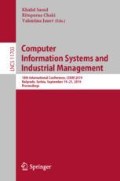Abstract
A balanced method for the minimization of incompletely specified finite state machines (FSMs) implemented on Field Programmable Logic Devices (FPGA) is proposed. In this method, such optimization criteria as the power consumption, speed of operation and device area are taken into account already at the stage of minimizing internal states. The method also takes into consideration the technological features of programmable logic and the state encoding method. The method is based on sequential merging of two internal states. For this purpose, the set of all pairs of states that can be merged is found, and the pair of states that has the highest rank is chosen for merging. The rank is calculated on the base of estimations of power, speed and area parameters and the user is able to choose the direction of minimization by setting weights for each criteria. In addition, the proposed method allows to minimize the number of transitions and redundant input variables of the FSM. Algorithms for the estimation of optimization criteria values are described and experimental results are also discussed.
Access this chapter
Tax calculation will be finalised at checkout
Purchases are for personal use only
References
Hallbauer, G.: Procedures of state reduction and assignment in one step in synthesis of asynchronous sequential circuits. In: Proceedings of the International IFAC Symposium on Discrete Systems, Riga, Pergamons, pp. 272–282 (1974)
Lee, E.B., Perkowski, M.: Concurrent minimization and state assignment of finite state machines. In: Proceedings of the IEEE International Conference on Systems, Man and Cybernetics, Minneapolis. IEEE Computer Society (1984)
Benini, L., De Micheli, G.: State assignment for low power dissipation. IEEE J. Solid State Circuits 30(3), 259–268 (1995)
Aiman, M., Sadiq, S.M., Nawaz, K.F.: Finite state machine state assignment for area and power minimization. In: Proceedings of the IEEE International Symposium on Circuits and Systems (ISCAS), pp. 5303–5306. IEEE Computer Society (2006)
Lindholm, C.: High frequency and low power semi-synchronous PFM state machine. In: Proceedings of the IEEE International Symposium on Digital Object Identifier, pp. 1868–1871. IEEE Computer Society (2011)
Shiue, W.-T.: Novel state minimization and state assignment in finite state machine design for low-power portable devices. Integration, VLSI J. 38, 549–570 (2005)
Rama Mohan, C., Chakrabarti, P.: A new approach to synthesis of PLA-based FSM’s. In: 1994 Proceedings of the 7th International Conference on VLSI Design, Calcutta, India, pp. 373–378. IEEE Computer Society (1994)
Gupta, B.N.V.M., Narayanan, H., Desai, M.P.: A state assignment scheme targeting performance and area. In: 1999 Proceedings of the Twelfth International Conference on VLSI Design, Goa, India, pp. 378–383. IEEE Computer Society (1999)
Liu, Z., Arslan, T., Erdogan, A.T.: An embedded low power reconfigurable fabric for finite state machine operations. In: 2006 Proceedings of the International Symposium on Circuits and Systems (ISCAS), Island of Kos, Greece, pp. 4374–4377. IEEE Computer Society (2006)
Nedjah, N., Mourelle, L.: Evolutionary synthesis of synchronous finite state machines. In: Proceedings of the International Conference on Computer Engineering and Systems, Cairo, Egypt, pp. 19–24, 5–7 November 2006
Chaudhury, S., KrishnaTejaSistla, K.T., Chattopadhyay, S.: Genetic algorithm based FSM synthesis with area-power trade-offs. Integration, VLSI J. 42, 376–384 (2009)
Yuan, L., Qu, G., Villa, T., Sangiovanni-Vincentelli, A.: An FSM reengineering approach to sequential circuit synthesis by state splitting. IEEE Trans. CAD 27, 1159–1164 (2008)
Klimowicz, A., Solov’ev, V., Grzes, T.: Minimization method of finite state machines for low power design. In: Proceedings of Euromicro Conference on Digital System Design, Funchal, 2015, pp. 259–262 (2015)
Klimowicz, A.: Performance targeted minimization of incompletely specified finite state machines for implementation in FPGA devices. In: 2017 Proceedings of Euromicro Conference on Digital System Design, Vienna, pp. 145–150 (2017)
Klimovich, A., Solov’ev, V.V.: Minimization of mealy finite-state machines by internal states gluing. J. Comput. Syst. Sci. Int. 51(2), 244–255 (2012)
Klimovich, A., Solov’ev, V.V.: A method for minimizing moore finite-state machines by merging two states. J. Comput. Syst. Sci. Int. 50(6), 907–920 (2011)
Grzes, T.N., Solov’ev, V.V.: Sequential algorithm for low-power encoding internal states of finite state machines. J. Comput. Syst. Sci. Int. 53(1), 92–99 (2014)
Zadeh, L.A.: Optimality and non-scalar-valued performance criteria. IEEE Trans. Automat. Contr. AC 8, 59–60 (1963)
Tsui, C.-Y., Monteiro, J., Devadas, S., Despain, A.M., Lin, B.: Power estimation methods for sequential logic circuits. IEEE Trans. VLSI Syst. 3, 404–416 (1995)
Zakrevskij, A.D.: Logic Synthesis of Cascade Circuits. Nauka, Moscow (1981). (in Russian)
Yang, S.: Logic synthesis and optimization benchmarks user guide, Version 3.0. Technical report. Microelectronics center of North Carolina, North Carolina (1991)
Acknowledgements
The research was done in the framework of the grant S/WI/3/2018 and financed from the funds for science by MNiSW.
Author information
Authors and Affiliations
Corresponding author
Editor information
Editors and Affiliations
Rights and permissions
Copyright information
© 2019 Springer Nature Switzerland AG
About this paper
Cite this paper
Klimowicz, A. (2019). Balanced Power, Speed and Area Minimization of Finite State Machines for FPGA Devices. In: Saeed, K., Chaki, R., Janev, V. (eds) Computer Information Systems and Industrial Management. CISIM 2019. Lecture Notes in Computer Science(), vol 11703. Springer, Cham. https://doi.org/10.1007/978-3-030-28957-7_39
Download citation
DOI: https://doi.org/10.1007/978-3-030-28957-7_39
Published:
Publisher Name: Springer, Cham
Print ISBN: 978-3-030-28956-0
Online ISBN: 978-3-030-28957-7
eBook Packages: Computer ScienceComputer Science (R0)

